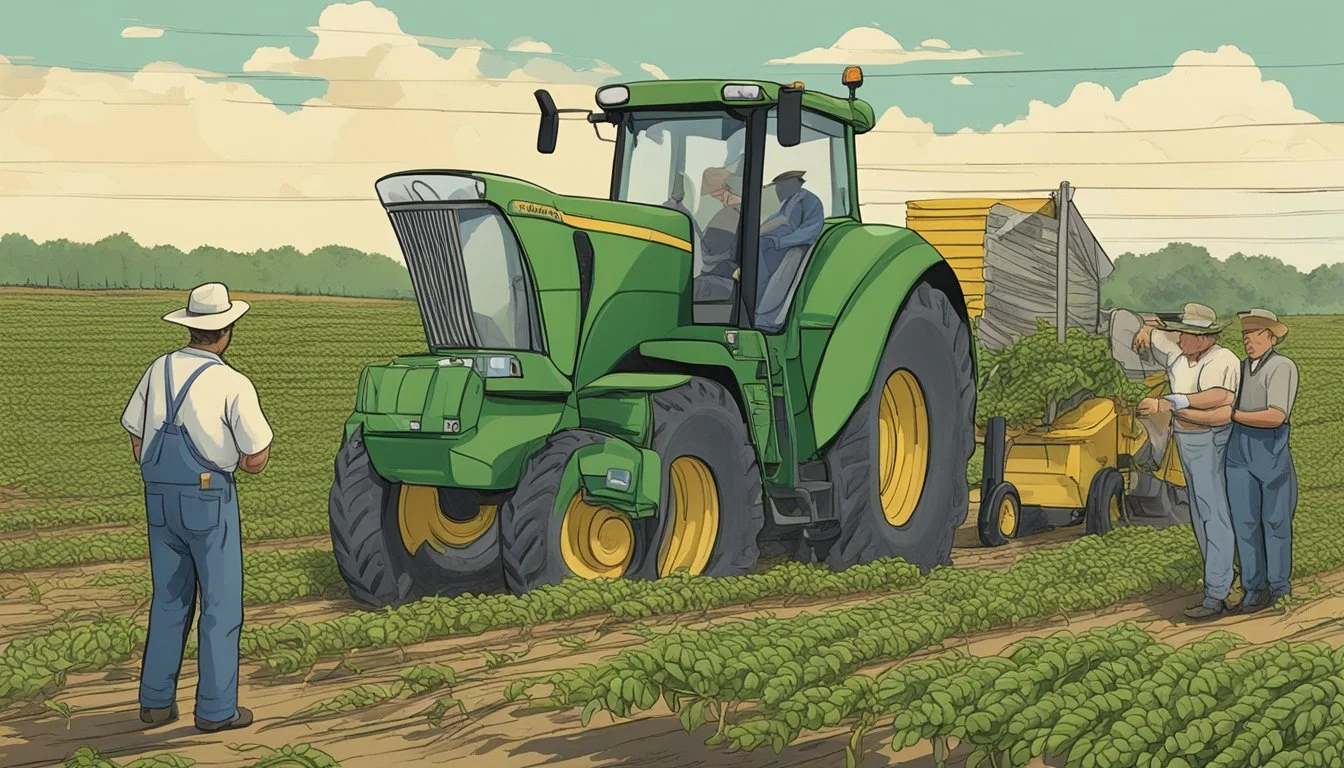Farm Loans in Arkansas
Navigating Options and Opportunities
This Article is Part of Our Guide on Farm Loans for All 50 U.S. States
Agriculture remains a cornerstone of Arkansas' economy, and securing financing is a crucial aspect for the state's farmers and aspiring agriculturists. Farm loans in Arkansas are specialized financial products designed to meet the unique needs of the agricultural community. Whether these needs include purchasing new farmland, upgrading equipment, or ensuring operational cash flow, an array of loan services are available to support these endeavors. The state's farming sector can access financial support through federal programs, including those offered by the USDA Farm Service Agency, which offers commodity loans, price support, and conservation financial assistance.
Several independent Farm Credit associations operate in Arkansas, each serving specific regions of the state. These member-owned institutions provide financial solutions tailored to the agricultural communities they serve. From the western territories covered by Farm Credit of Western Arkansas to the central and eastern regions assisted by AgHeritage Farm Credit Services and Farm Credit Mid-America, farmers are afforded opportunities to obtain credit and other monetary backing necessary for their farming operations.
For individualized support, Arkansas farm loans are designed with flexibility in mind to address the diverse agricultural practices and scenarios present across the state. Arkansas farmers and ranchers, often coming from robust agricultural backgrounds themselves, find that tailored loan packages can effectively align with their farming operation and financial objectives. With resources available for consultation and the provision of competitive farm loan interest rates, Arkansas stands as a supportive framework for its agricultural entrepreneurs to thrive.
Understanding Farm Loans
When delving into farm loans in Arkansas, two key aspects are crucial: understanding the various types of loans available to farmers and recognizing the pivotal roles of the United States Department of Agriculture (USDA) and the Farm Service Agency (FSA) in providing financial assistance to the agriculture sector.
Types of Farm Loans
Farm loans serve as a vital financial resource for farmers and ranchers, addressing their diverse needs in the agricultural industry. They can be broadly categorized into several types:
Operating Loans: for day-to-day operations or to purchase items like livestock, seed, and equipment.
Farm Ownership Loans: aimed at helping farmers purchase or expand a farm.
Microloans: designed for smaller loans with a simplified application process.
Emergency Loans: available to help farmers recover from natural disasters.
Youth Loans: intended to support the agricultural projects of young people participating in 4-H clubs, FFA, or a similar organization.
Guaranteed Loans: where the USDA backs the loan provided by a lender.
Role of USDA and FSA
The USDA, through the FSA, plays a critical role in supporting rural communities with various loan programs. The FSA provides direct loans and also guarantees loans offered by commercial lenders. The assistance from the USDA and the FSA is essential for the growth and sustainability of farms and can be a lifeline for beginning farmers, socially disadvantaged groups, and established farmers during times of emergency. The Farm Loan Programs offered by the FSA include:
Direct and guaranteed farm ownership and operating loans.
Loans targeting beginning farmers and ranchers, as well as socially disadvantaged groups.
Programs catered to youth involvement in agriculture.
Emergency support when rural agriculture is hit by unforeseen crises.
The FSA also offers tools like the Loan Assistance Tool, which guides prospective loan applicants through the process, ensuring they understand the requirements and procedures. Moreover, as of January 2024, most farm loan borrowers can now make their loan payments online, further demonstrating the USDA’s commitment to modernizing and streamlining financial transactions for the convenience of farmers.
Eligibility and Application Process
Navigating the farm loan application process in Arkansas requires meeting specific eligibility criteria and following a series of steps designed to help farmers secure the financial assistance they need.
Qualifying for Farm Loans
To qualify for farm loans through Farmers.gov, applicants must fulfill loan eligibility requirements such as being a full-time farmer or rancher. Additionally, beginning farmers and those operating family farms may have different requirements to meet. For instance, the Arkansas Century Farm Program stipulates that the same family should have owned the farm for 100 years or more.
Loan Types:
Operating loans: For day-to-day operations or to purchase livestock and feed
Microloans: Streamlined process, smaller amounts for beginners or smaller farms
Direct Loans: Provided to applicants by the USDA
Applicants must also develop a farm business plan and outline their farming goals to present their case for the loan convincingly.
Steps to Apply for a Loan
The first step in the application process involves visiting Farmers.gov to use the Farm Loan Discovery Tool, which guides potential applicants through the various loan options available. The tool acts as a loan assistance resource, helping to match the needs of the farmer with the appropriate USDA loan.
Application Submission Process:
Preparation:
Use the Farm Loan Discovery Tool to identify appropriate loan options.
Review the necessary FSA forms required for the loan application.
Meeting with a Loan Officer:
Determine the nearest USDA Service Center and schedule a meeting with a Loan Officer.
Loan Officers provide personalized guidance throughout the application process.
Completing Application:
Fill out the required forms with accurate information about the farming operation.
Attach supporting documents and use the electronic signature option if applying online.
Applications can be submitted through Farmers.gov using the online application portal that has been made available, simplifying the process of applying for a Direct Loan. When the application is complete, it must be submitted either online or in person at a USDA Service Center for review and further action.
Financial Products and Services
Arkansas offers a variety of financial products and services specifically tailored to support the agricultural industry. These products include different loan options and credit lines that are essential for farmers to start, expand, maintain, or refinance their operations.
Loan-to-Value and Refinancing
Loan-to-Value (LTV): Financial institutions in Arkansas provide loans with varying LTV ratios, a metric used to determine the lending risk before issuing a mortgage. The LTV ratio influences the terms of financing and has a direct effect on whether borrowers will need to purchase private mortgage insurance.
Typical LTV ratios for farm loans can range depending on the lender and the type of loan.
Higher LTV ratios often indicate a need for additional security or higher interest rates.
Refinancing: Refinancing services are available for farmers looking to improve their financial standing. Benefits of refinancing include:
Reduced interest rates
Lower monthly payments
Consolidation of debt
Cash-out options for additional investments or covering operational costs
Loan Terms and Conditions
Loan Terms: The terms of a loan encompass the length of time the borrower has to repay the loan, along with the interest rate and payment schedule. Farmers should understand these terms fully before entering into an agreement.
Short-term loans may offer lower interest rates but require faster repayment.
Long-term loans provide smaller, more manageable payments over time but may accrue more interest.
Loan Conditions: In Arkansas, conditions for obtaining a farm loan can include but are not limited to:
Creditworthiness: Assessment of repayment risk based on credit history.
Property Value: Determination of loan amount based on farm's appraised value.
Farm Credit: Loans may come from entities specializing in agricultural lending, offering services tailored to the farm economy.
Equipment Loans and Lines of Credit: Financial institutions offer loans for purchasing new or used farm equipment. Lines of credit provide flexible funds that can help manage cash flow throughout the farming season.
Closing Costs: Transparency in closing costs for loans is crucial, which includes fees associated with loan processing, underwriting, and the recording of legal documents.
When seeking financial services, farmers in Arkansas should thoroughly explore their options to find the most favorable terms for their specific needs.
Specialized Loans
Arkansas's agricultural financing landscape offers targeted loan options for various farming demographics and operation types, ensuring the financial needs of diverse agricultural businesses are met.
Young and Beginning Farmers
Young and beginning farmers in Arkansas have access to special loan programs designed to help them establish and expand their operations. Microloans are one such program, offering smaller, more accessible loans tailored specifically for newcomers to agriculture — encompassing both crop and livestock production. These loans recognize the financial barriers new entrants may face and aim to provide a more feasible entry point into farming. Additionally, Youth Loans cater to individuals involved in 4-H Clubs and FFA by offering financial opportunities to support their educational agricultural projects.
Microloans:
Purpose: To assist new and small operators in starting or growing their business.
Eligibility: Beginning farmers, including small operations and non-traditional agricultural businesses.
Terms: Simplified application process with lower borrowing limits for easier repayment.
Youth Loans:
Purpose: Aimed at supporting young individuals participating in agricultural youth organizations.
Beneficiaries: Members of 4-H Clubs and FFA carrying out educational agricultural projects.
Benefits: Encourages responsibility and provides a financial foundation in agriculture.
Non-Traditional and Specialty Operations
The farm loan landscape in Arkansas extends beyond conventional farming to support Non-Traditional and Specialty Operations. These operations often involve innovative agricultural practices or uncommon commodities that don’t fit standard loan criteria. In recognition of their unique needs, specialized lending products and expertise are offered to these farmers to manage seasonality and business cycles effectively within their niche markets.
Specialized Loans for Non-Traditional Operations:
Focus: Catering to agricultural businesses with unique production cycles or products.
Flexibility: Designed to understand and accommodate the specific challenges and financial needs of non-traditional farming.
These tailored financial offerings underscore the commitment to fostering a diverse and innovative agricultural sector within Arkansas, addressing the changing dynamics and emerging trends in the industry.
Farm Operations in Arkansas
Farm operations in Arkansas encompass a broad spectrum of activities, from managing costs to effectively utilizing land and resources. Operators must balance the financial demands of livestock, feed, and farm improvements while considering family living expenses.
Managing Farm Operating Costs
Farm operating costs in Arkansas are a significant factor in the sustainability of farm businesses. These costs include:
Livestock: Expenses related to the purchase, care, and feeding of animals. Given Arkansas's diverse agricultural landscape, livestock operations need to budget effectively for feed costs and animal health care.
Feed: The cost of feed can vary, but it's a critical input for livestock health and productivity.
Family Living Expenses: Farmers must not overlook personal expenses as they impact the overall financial health of the operation.
Improvements: Investments in infrastructure, such as barns and irrigation systems, are long-term costs that can enhance productivity.
A strategic approach to managing these expenses is essential for financial stability and growth.
Maximizing the Use of Land and Resources
Arkansas's rich soil and proximity to the Mississippi River offer prime conditions for maximizing land use. Effective resource management includes:
Soil and Water Resources: Management practices to maintain soil health and optimize water use vary according to the specific conditions and proximity to the Mississippi River.
Productivity: Aligning the use of real estate to the farm's operational focus, whether that's crop cultivation or livestock, can maximize productivity.
Real Estate: Careful selection of property for expansion and evaluating land quality for suitability in agricultural ventures are critical for long-term success.
The state's agriculture benefits from understanding and adapting to the natural resources available, ensuring sustainable and profitable farm operations.
Disaster Assistance and Emergency Relief
Disaster assistance and emergency relief are critical in supporting farmers through the unpredictable challenges posed by natural disasters. These efforts are designed to ensure the stability and recovery of rural communities and agricultural operations in Arkansas.
Emergency Loans and Natural Disasters
In the event of natural disasters, such as droughts, floods, or other catastrophic events, farmers in Arkansas have access to Emergency Loans through the USDA Farm Service Agency (FSA). The intention of these loans is to help producers recover from production and physical losses. Eligible individuals can contact their local USDA Service Center to obtain more Loan Information and begin the application process.
Eligibility Criteria for Emergency Loans - Affected by a natural disaster. - Considered essential for the farming operation. - Ability to repay the loan. - Acceptable credit history.
Emergency Loans can provide up to $500,000 to cover:
Restoration or replacement of essential property.
Production costs for the disaster year.
Essential family living expenses.
Agricultural operation reorganization.
Refinancing of certain debts.
To safeguard and support rural communities, the disaster set-aside program offers temporary relief, allowing farmers with existing direct loans who cannot make scheduled payments due to disasters, a chance to delay them. The overarching goal is to provide Support to farmers, ensuring that despite severe natural adversities, the backbone of the rural economy remains strong and resilient.
Accessing Services and Resources
Farmers in Arkansas have at their disposal a variety of services and resources to assist with obtaining farm loans. Key among these are the professional support provided by Loan Officers and the convenience of online tools to facilitate the application process.
Connecting with FSA and the Loan Officer
Farmers seeking loans are encouraged to connect with the Farm Service Agency (FSA) at a local USDA Service Center. Here, a Loan Officer can provide guidance on choosing the appropriate loan program tailored to the farmer's needs. These Loan Officers are equipped with information about various financing options and can elucidate the terms and conditions of different loan types.
Utilizing Online Tools and Information
For farmers preferring online access to loan resources, https://www.farmers.gov/ serves as a comprehensive portal. On this website, producers can use the Farm Loan Discovery Tool to explore available loan options or the Loan Assistance Tool to start the application process. After establishing a USDA customer account and obtaining a USDA Level 2 eAuthentication or a Login.gov account, farmers can complete their loan applications through this online system. This streamlined online approach aims to make loan information easily accessible and the application process more straightforward.






